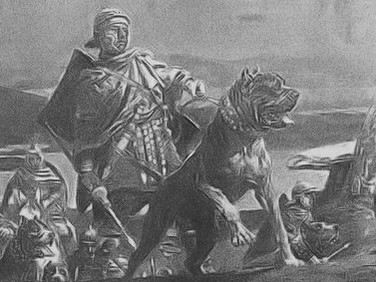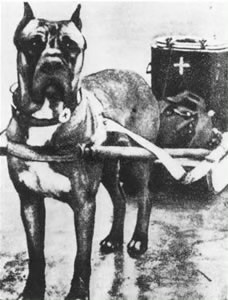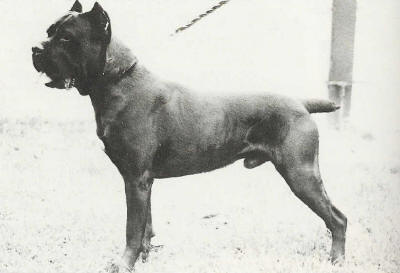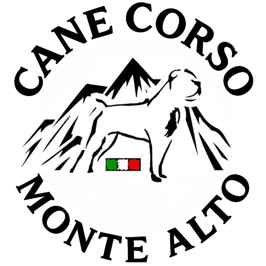Cane Corso History
The Cane Corso is an ancient Italian breed. The direct ancestor of the Cane Corso is the 'Canis Pugnax' (the old Roman Molossian) of which Corsi is the 'light version' and was employed as an 'auxiliary warrior' in the Roman Wars. The 'heavy version' refers to what is now known as the Neapolitan Mastiff. The Cane Corso name is derived from the word 'Cane' which means dog and 'Cohors' which means 'guardian' or 'protector'. After the Roman Wars, the courageous Corso became known as both a hunter/catch-dog for the large game (boar, bear, & deer) as well as for the protection of property and livestock. Being exceptionally versatile has allowed the Corso to adapt to the continually changing roles over the years as agriculture has diminished and now new roles have emerged, primarily found as family protectors and companions. Although largely unheard of outside of Italy until recent years, the Corso was a staple in Italian culture for much of the modern world. After World War II, the population of Corsos declined as their working needs were no longer in demand.


During the mid-1970s, a few Cane Corso enthusiasts fondly recalled the majestic dogs of the early 20th century and worked together to locate some Corsi still known in remote villages and began to revitalize the breed. In the 1980's the first corsi arrived in the United States. Since then, the Cane Corso has been accepted as a breed in the Italian Kennel Club (ENCI) in 1994, the World Kennel Club (FCI) in 1997, and the American Kennel Club (AKC) in 2010. The temperament of the Cane Corso is not one for first-time dog owners as they will often have a dominant personality and are naturally very protective of their families and property. As a guardian breed, Corsos are also naturally intuitive and suspicious of change. Corsos bond very closely with their families and require strong, consistent leadership. Because they bond so closely, this often makes them relatively easy to train as they are constantly trying to please their owners. Starting early and maintaining continuous socialization is key to having a stable, even-tempered dog easily adaptable to changes. In general, a Corso will be naturally gentle and very tolerant with children. Even though they may look 'tough', Corsos have a very sensitive nature that lends itself to complete devotion to the family. Their true goofy personalities are often reserved only for their family and possibly close friends. When disciplining a Corso, often a strong word or a harsh tone is all that is needed to get the message across, as they often sulk for hours after being reprimanded. These dogs genuinely crave attention and love, to the point that they are often described as 'velcro dogs'. Many Corsos suffer from separation anxiety if not properly socialized from a young age. Overall, a Cane Corso has the potential to be one of the best dogs you have ever owned, but be aware and be informed before deciding to purchase a Corso. These dogs require a high level of commitment, strong, firm leadership, moderate activity, and plenty of love! However, to be utterly, totally, and completely loved by a Corso is to have a fiercely loyal life companion! Care and upkeep Because the breed can be suspicious of strangers, extensive socialization of puppies is a necessity. The Cane Corso is a powerful dog that may be difficult to walk on a leash, and a harness should never be used, as that makes it easier for the animal to pull. Coat care is minimal, requiring only a quick brushing once or twice a week and occasional bathing.


As a breed susceptible to canine hip dysplasia, Cane Corso puppies should be raised on large-breed puppy food, which slows the rate of growth and lessens the risk of dysplasia. Temperament The Cane Corso’s temperament reflects its long use as a guardian and warrior. Thus, the breed is not particularly trusting of strangers, nor is it very friendly toward other dogs or animals. When provoked, it can be fearsome. The Cane Corso is an excellent watchdog and, with training, a protection dog. It is fairly independent and about average in terms of ease of training. The breed is affectionate but somewhat serious. Because of the Cano Corso’s strength and determination, it is not the ideal dog for children or the elderly. It is also not well suited for multiple-dog households, especially with other dogs of the same sex. The breed’s energy level is about average. The Cane Corso is not as toy-oriented as many other breeds, and most individuals are not interested in retrieving. It should be noted that these claims are a traditional and widely accepted generalization about the Cane Corso, and the behavior of individuals within the breed may differ.


